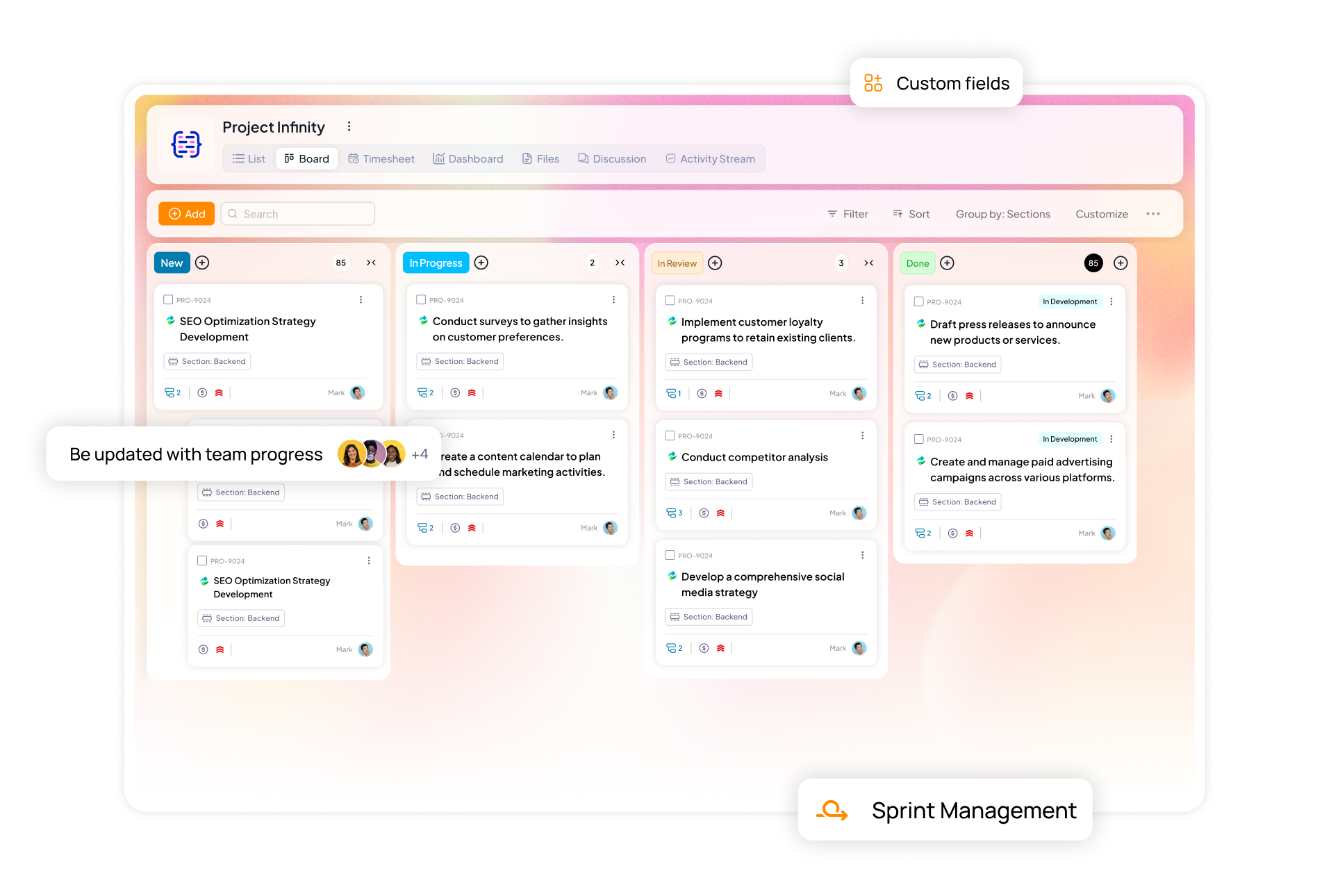If you’ve ever built or run a marketing agency, you know exactly what it feels to manage BD, internal team management, agency growth, and individual projects. It’s thrilling, but it can quickly become overwhelming.
To a point, you can handle the glorious chaos, but beyond that, things start to slip from your hands, and if you’re not careful, you may be missing out on new business or losing existing ones to sloppy execution.
Without someone to anchor project management for you, things can go south very fast, especially if you’re on the growth track. That someone is the marketing project manager, the quiet, steady force every agency founder hopes to have on their team.
But, aren’t they same as every other project manager? Who are they, what do they do and why are they special? This article will take you through exactly that.
Who is a Marketing Project Manager?
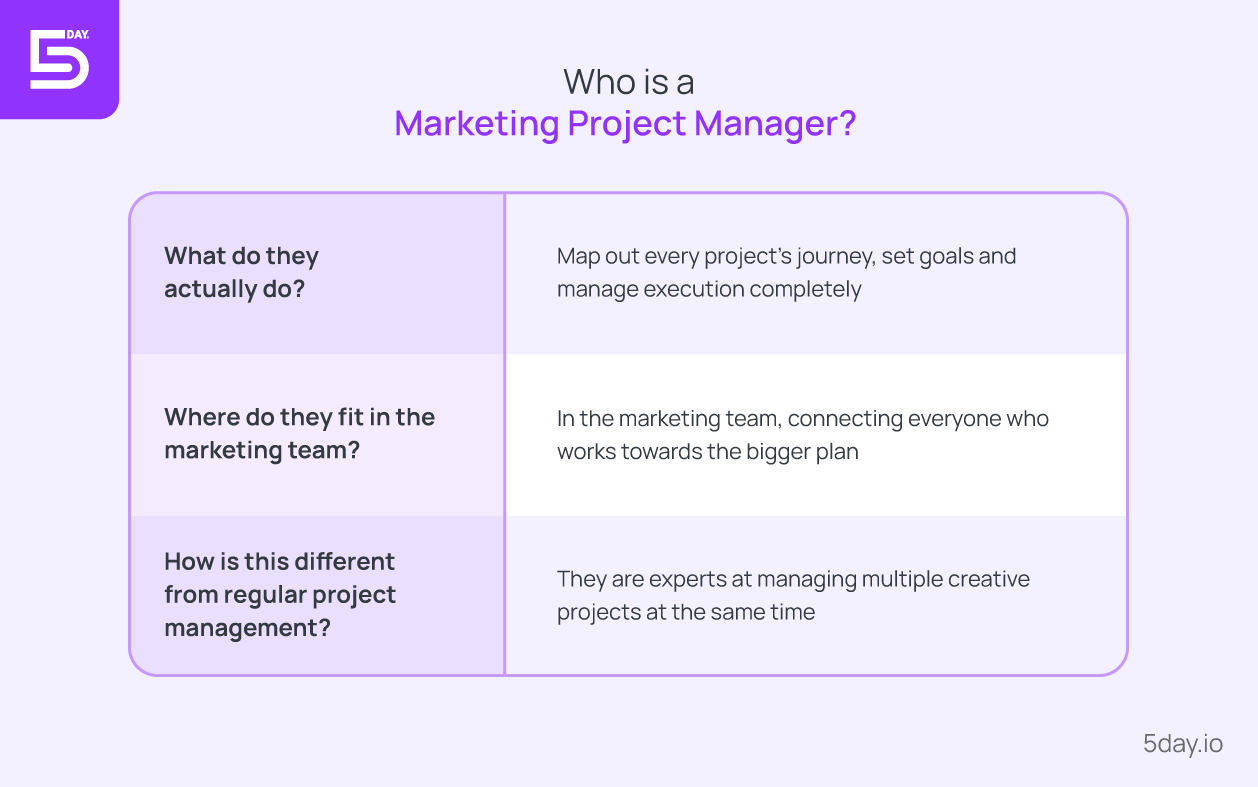
They’re basically the organizer-in-chief of marketing projects and they make sure everything runs smoothly from the moment the idea is born to the moment it hits the market and beyond.
What do they actually do?
You can compare their role to the captain of a creative ship. They map out the journey, setting goals and deadlines while making sure everyone on the team knows what they need to do and when to do it. Their job is to keep the crew (designers, copywriters, campaign folks, and digital experts), all in sync.
On top of that, they juggle budget and ensure every dollar spent brings back the biggest impact. They’re also the main messenger, keeping the client, Marketing Head and the whole team in the loop so there are no surprises. And if things start to wobble, they jump right in to smooth out bumps and keep the campaign plan going right.
Where do they fit in the marketing team?
At the top, you have the Marketing Director, who sets the big-picture goals for the client. Campaign Managers cook up the strategies to meet those goals. Designers and Copywriters bring the brand’s story to life with eye-catching visuals and compelling words. The marketing project manager is the glue holding it all together making sure everything happens right on schedule.
They work side-by-side with all these folks, coordinating efforts and making sure the brand’s voice stays true throughout.
How is this different from regular project management?
Unlike regular project managers who may or may not know the industry nuances, they know brand messaging inside and out, making sure every campaign feels authentically connected to the client’s identity. Managing creative projects is a big part of their day, where things are always changing as ideas get refined and polished.
They also keep a sharp eye on campaign results, tracking clicks, shares, and sales, to see if the project really hit the mark. Because marketing trends can shift overnight for different industries and audiences, they need to be flexible and quick on their feet.
Core responsibilities of a marketing project manager
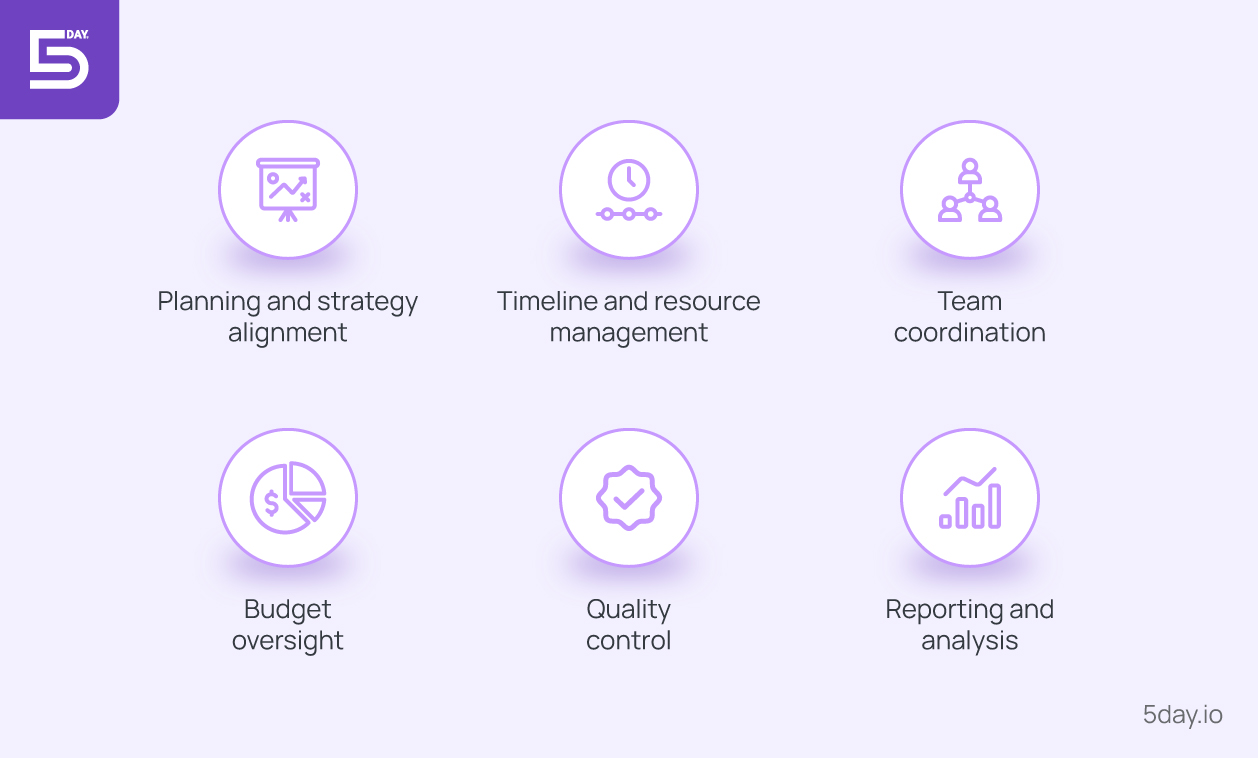
Planning and strategy alignment
The marketing project manager is the one who takes the big-picture ideas and turns them into concrete, achievable goals. They carefully define the project scope, what success looks like, and what the key project deliverables are. The crux of what a marketing project manager does is to make sure that every piece of the project connects to the client’s larger mission and vision.
Timeline and resource management
Time is often the fiercest opponent in marketing. Every single step, whether it’s creative or a mundane operational task has to be done within a strict timeframe to capture the audience’s attention in the best way possible. That’s where you need a mastermind to put the right people onto the right things to get the best output possible in a timely manner. And that’s who the marketing project manager is.
It’s a delicate balancing act, and the pressure can be intense, and they can’t be everyone’s friend, but it’s this precise orchestration that keeps the project on track, making sure nothing important slips through the cracks.
Team coordination
A marketing campaign is a symphony of talents working together. The marketing project manager acts as the conductor and they bring the team together to produce amazing work.
They create a space where ideas flow freely, and problems are solved quickly. Regular check-ins help connect the team collaborate better, celebrate wins, and tackle challenges head-on. They are, in fact, the glue of the team.
Read Also: How Project Management Software Helps in Better Collaboration
Budget oversight
They keep a close eye on every dollar spent. They meticulously track expenses against the budget, knowing that overstepping the budget can derail the team’s reputation and future opportunities with the client. This is one of the most important marketing project manager responsibilities.
But more than just watching the numbers, they must be proactive. They should flag any potential overruns early. They must also find creative solutions to stay within limits without sacrificing quality.
It’s a role that requires honesty, and sometimes tough conversations.
Quality control
The final product is what the world sees and remembers, so it must be spot-on. The marketing project manager takes pride in ensuring that every deliverable meets the brand’s guidelines and the team’s high standards. They are the last line of defense against errors, and anything that feels off-brand.
Reporting and analysis
Once the campaign is out in the world, the work doesn’t stop. The marketing project manager steps back and looks at the numbers, and the results. They provide performance reports that tell the story of what happened and why, and these reports are insights that help the team learn and grow.
The post-project reviews are super crucial and the marketing project manager is at the core of looking back at projects retrospectively and seeing what to take forward to the next campaign and what to fix. It’s this commitment to continuous improvement that helps the team nurture what is thriving and fix what’s leaking.
The essential skills every marketing project manager needs
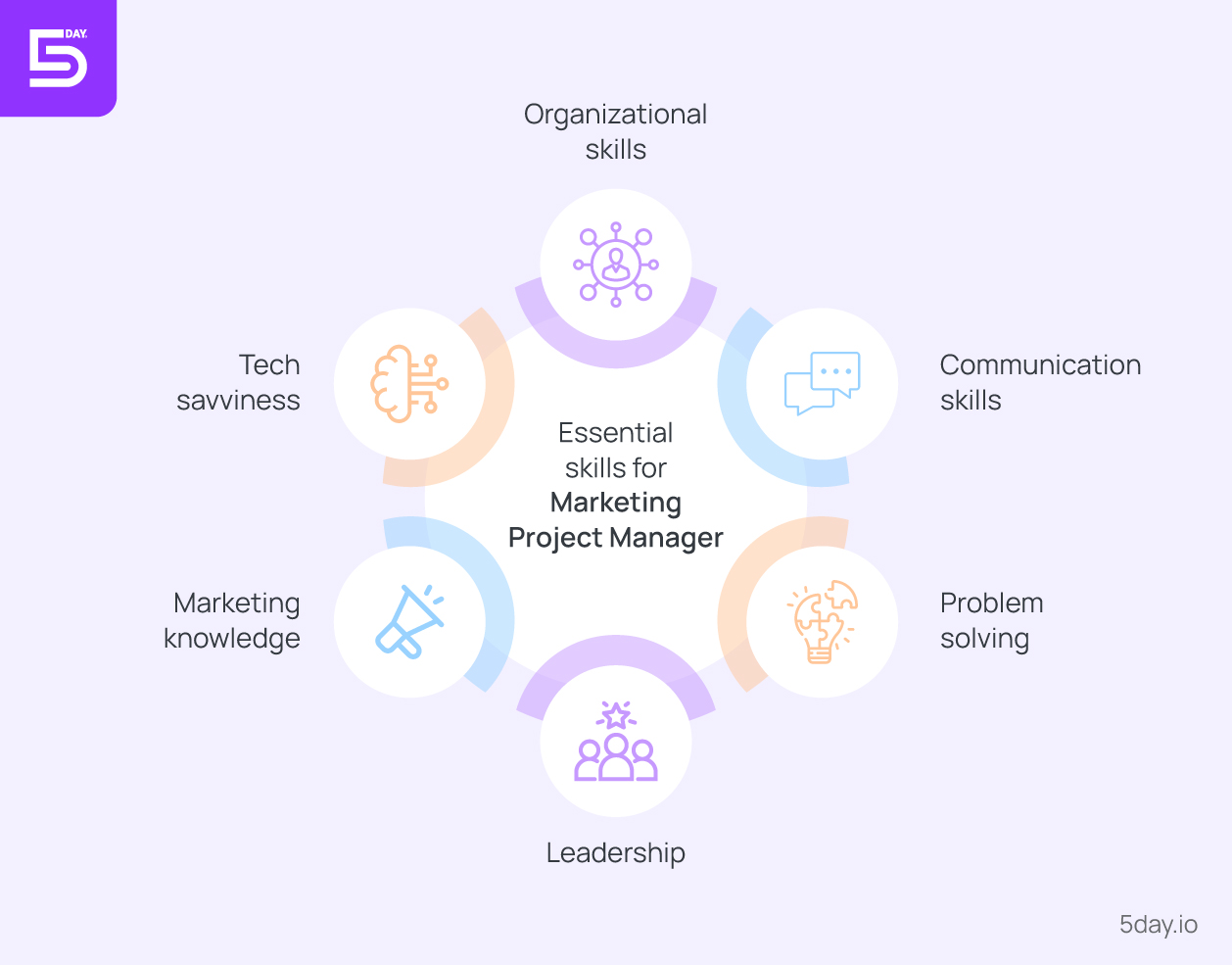
Organizational skills
Being organized is what makes the marketing project manager’s Day. Juggling several marketing campaigns all at once, each with its own deadlines, creative assets, and stakeholders without letting anything fall through the cracks requires an almost sixth sense for organization, which is a key marketing project manager skill.
The best project managers for marketing keep everything aligned like a perfectly stacked set of dominoes. Their organizational prowess means the team never feels overwhelmed, and quality never takes a backseat.
Read Also: Future of Work Management in Agencies
Communication skills
They are the translators who takes complex, sometimes confusing project requirements and breaks them down into clear, actionable instructions for the team. More than just giving orders, they listen deeply and create an environment where questions are welcomed. This skill keeps the entire team connected through different project milestones.
Problem-solving
Whether it’s a last-minute creative change, a technical hiccup in a digital campaign, or a suddenly shifting timeline, they are the calm problem-solvers who steps up when things get tricky. They think critically and creatively to find solutions fast.
Sometimes that means negotiating deadlines, or finding quick fixes that keep quality intact without burning out the team. Their ability to turn potential disasters into manageable challenges is what keeps campaigns on track.
Leadership
Marketing project managers lead by example, especially when the pressure mounts. They motivate their teams to meet deadlines, bring their best ideas and energy to the table. They recognize individual strengths and offer encouragement when the going gets tough. Higher-ups may not know what’s going on in the trenches, and sometimes may overlook what employees go through.
But, being shoulder to shoulder in the trenches with the team everyday, they are the best person to nurture people, solve problems for them and keep them going.
Read Also: Task Management Strategies for Marketing Teams
Marketing knowledge
They need to understand the marketing world itself. This means having a solid grasp of branding principles, digital marketing channels, content strategies, and how all these pieces fit together to tell a compelling story. When they understand the “why” behind the work, they can make smarter decisions. This knowledge also earns them respect from creative teams and executives alike.
Tech savviness
Marketing project managers must be comfortable navigating marketing automation platforms, project management software, and analytics dashboards without missing a beat. Whether it’s setting up workflows in tools like 5day.io, coordinating email campaigns through platforms like Mailchimp, or interpreting Google Analytics data, they use technology as a powerful ally to streamline work and enhance results.
This tech-savviness also means they can quickly adapt when new tools emerge, ensuring the team stays efficient and competitive in a digital world.
The Marketing project manager’s tech stack
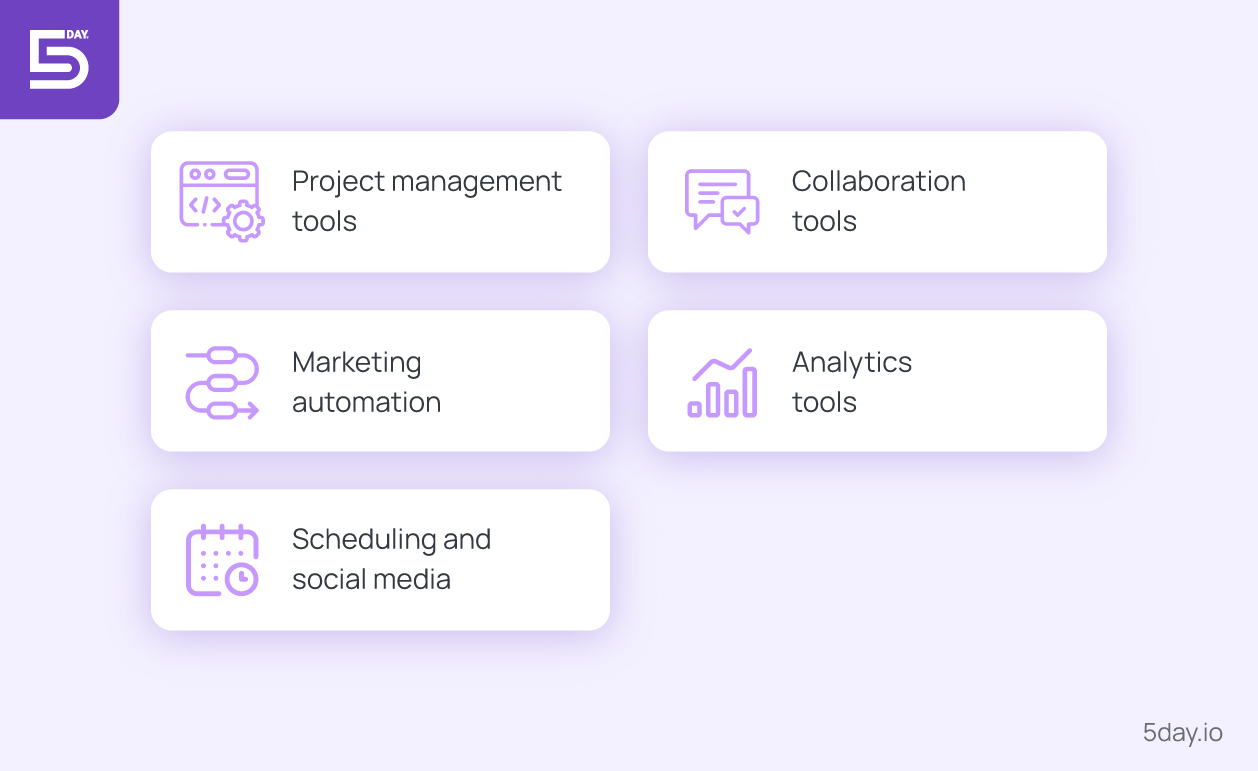
Behind every brilliant marketing campaign, there’s a hidden engine, a collection of tools that moves the needle.
Project management tools
Effortless, intuitive project management tools like 5day.io are your greatest ally. With 5day.io, a marketing project manager can turn any complicated task or project into sub-tasks, assign to different parties and manage them all effortlessly.
It’s the silent partner that carries the weight, ensuring nothing slips through the cracks so the team can focus on what truly matters.
Collaboration tools
Marketing thrives on connection. The magic happens when teams share boldly, and move together as one. That’s why platforms like Slack, and Google Workspace are indispensable. They create virtual spaces where a quick message or a shared file can spark the next big breakthrough.
With 5day.io, you get a marketing team project management tool and collaboration tool in one or integrate the platforms you use. This is a priceless combination of tools for marketing project managers.
Marketing automation
Marketing is part art, part science, and automation is how the two come together. Tools like HubSpot, Marketo, etc. that handle the repetitive, time-consuming tasks that could otherwise drain creativity. They send personalized emails and keep campaigns humming 24/7.
Additionally, workflow automation on 5day.io helps you automatically manage tasks, and approvals, so things don’t get stuck or forgotten. Instead of manually moving work from one person to another, the platform sets up rules and steps that guide tasks automatically from start to finish.
Analytics tools
Platforms like Google Analytics and Tableau transform raw numbers into stories that reveal what captured hearts, and how to improve. These insights are gold for them.
Scheduling and social media
Marketing success often hinges on timing. Tools like Hootsuite and Buffer take the guesswork out of when and how to engage audiences. They let teams schedule posts across channels, ensuring the brand’s story is told consistently and compellingly. These platforms are reliable and make every message count at the right moment.
Read Also: Social media campaign checklist for marketing teams
Common challenges every marketing project manager encounters

Scope creep
Scope creep is one of the hardest parts of being a marketing project manager. It starts small like a new feature here, an extra post there. But before you know it, the original plan is buried under a growing to-do list. Managing it is a constant balancing act of knowing when to say yes and, just as importantly, when to say no to protect the project’s success.
Communication breakdowns
Communication breakdowns between creative teams and business stakeholders can create confusion and wasted effort. Marketing project managers often find themselves trying to bridge gaps between departments that speak different languages and have different priorities.
Resource bottlenecks
No matter how skilled the team, limited resources are a reality. Bottlenecks can slow progress and add pressure, and the marketing project manager needs to be the one to find extra support, and clever shortcuts to do more with less without compromising quality
Tight deadlines
Projects come with deadlines that feel like agile sprint finishes. Balancing the urgent need to launch on time with the desire to produce high-quality work is a relentless challenge. The pressure can be intense. For a marketing project manager, managing multiple clients under tight deadlines means mastering the art of prioritization, and maintaining a calm presence when the clock is ticking down.
Cross-functional conflicts
Marketing projects often involve sales, product, finance, and other teams, each with their own priorities, and conflicts can easily arise. A project manager acts as a diplomat and sometimes peacemaker, understanding other teams’ pressures, and keeping everyone aligned toward a shared vision.
Why do you need a Marketing PM in your marketing agency?
Orchestrate campaigns like a maestro
They ensure every team member knows their cue and every move counts. They are the secret ingredient to boosting campaign efficiency and stretching your marketing campaign ROI farther than you imagined.
The deadline defender and budget guardian
They are your deadline defender and budget guardian, always watching, ready to catch delays before they snowball. Their proactive management saves your team from last-minute scrambles and costly surprises.
The accountability champion
Success is about monitoring and knowing how well campaigns perform. When the marketing project manager becomes the accountability champion, they track progress and share client reports accurately. Their insights inspire the whole team to grow stronger with every project.
Freeing up leadership to dream bigger
Most importantly, they free up marketing leaders to focus on the big picture and growth. While the PM handles the day-to-day execution, leadership can dream bigger and think bolder.
Wrapping up
The role of a marketing project manager is often behind the scenes, yet their impact is front and center in every successful campaign. They are the steady hand guiding creativity through deadlines and challenges. Without them, even the best ideas risk getting lost in the shuffle.
So, the next time you see a flawless campaign that hits all the right notes, remember the unsung hero making it all possible. Because behind every great marketing story is a great project manager who turned dreams into deliverables.
To help your marketing project manager hit the ground running and get the most out of the team, bring in an intuitive project management tool like 5day.io, and watch how easy their daily work becomes.
Sign up for a 3-month free trial today to see the tool in all its glory, and decide for yourself.






